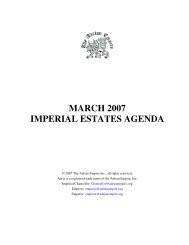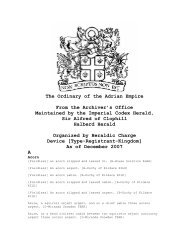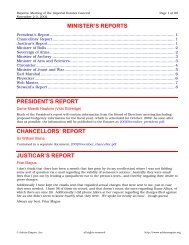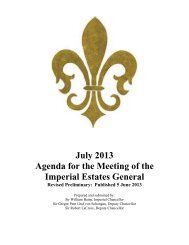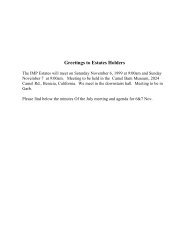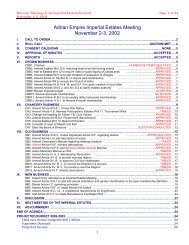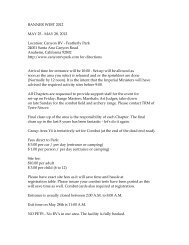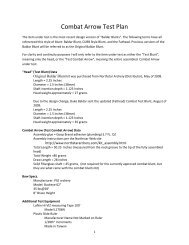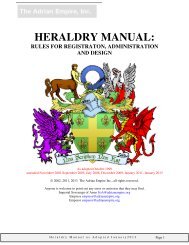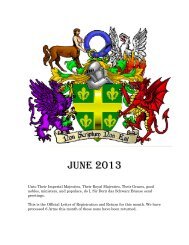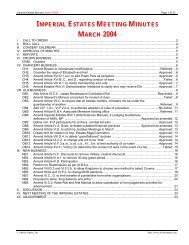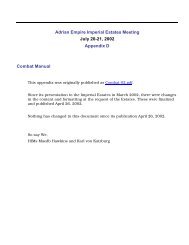Research Paper on the Black Death - Back to Main Page
Research Paper on the Black Death - Back to Main Page
Research Paper on the Black Death - Back to Main Page
Create successful ePaper yourself
Turn your PDF publications into a flip-book with our unique Google optimized e-Paper software.
were not able <strong>to</strong> ring bells as <strong>the</strong>y would have liked. C<strong>on</strong>cerning that [<strong>the</strong> government]<br />
issued ordinances discouraging <strong>the</strong> sounding of bells, sale of burial benches, and limiting<br />
expenses. They could not sound bells, sell benches, nor cry out announcements because<br />
<strong>the</strong> sick hated <strong>to</strong> hear of this and it discouraged <strong>the</strong> healthy as well. Priests and friars went<br />
[<strong>to</strong> serve] <strong>the</strong> rich in great multitudes and <strong>the</strong>y were paid such high prices that <strong>the</strong>y all got<br />
rich. And <strong>the</strong>refore [<strong>the</strong> authorities] ordered that <strong>on</strong>e could not have more than a<br />
prescribed number [of clerics] of <strong>the</strong> local parish church. And <strong>the</strong> prescribed number of<br />
friars was six. All fruits with a nut at <strong>the</strong> center, like unripe plums and unhusked<br />
alm<strong>on</strong>ds, fresh broadbeans, figs and every useless and unhealthy fruit, were forbidden<br />
entrance in<strong>to</strong> <strong>the</strong> city. Many processi<strong>on</strong>s, including those with relics and <strong>the</strong> painted<br />
tablet of Santa Maria Inpruneta, went through <strong>the</strong> city crying our "Mercy" and praying<br />
and <strong>the</strong>n <strong>the</strong>y came <strong>to</strong> a s<strong>to</strong>p in <strong>the</strong> piazza of <strong>the</strong> Priors. There <strong>the</strong>y made peace<br />
c<strong>on</strong>cerning important c<strong>on</strong>troversies, injuries and deaths. This [pestilence] was a matter of<br />
such great discouragement and fear that men ga<strong>the</strong>red <strong>to</strong>ge<strong>the</strong>r in order <strong>to</strong> take some<br />
comfort in dining <strong>to</strong>ge<strong>the</strong>r. And each evening <strong>on</strong>e of <strong>the</strong>m provided dinner <strong>to</strong> ten<br />
compani<strong>on</strong>s and <strong>the</strong> next evening <strong>the</strong>y planned <strong>to</strong> eat with <strong>on</strong>e of <strong>the</strong> o<strong>the</strong>rs. And<br />
sometimes if <strong>the</strong>y planned <strong>to</strong> eat with a certain <strong>on</strong>e he had no meal prepared because he<br />
was sick. Or if <strong>the</strong> host had made dinner for <strong>the</strong> ten, two or three were missing. Some fled<br />
<strong>to</strong> villas, o<strong>the</strong>rs <strong>to</strong> villages in order <strong>to</strong> get a change of air. Where <strong>the</strong>re had been no<br />
[pestilence], <strong>the</strong>re <strong>the</strong>y carried it; if it was already <strong>the</strong>re, <strong>the</strong>y caused it <strong>to</strong> increase. N<strong>on</strong>e<br />
of <strong>the</strong> guilds in Florence was working. All <strong>the</strong> shops were shut, taverns closed; <strong>on</strong>ly <strong>the</strong><br />
apo<strong>the</strong>caries and <strong>the</strong> churches remained open. If you went outside, you found almost no<br />
<strong>on</strong>e. And many good and rich men were carried from home <strong>to</strong> church <strong>on</strong> a pall by four<br />
beccamorti and <strong>on</strong>e t<strong>on</strong>sured clerk who carried <strong>the</strong> cross. Each of <strong>the</strong>m wanted a florin.<br />
This mortality enriched apo<strong>the</strong>caries, doc<strong>to</strong>rs, poultry vendors, beccamorti, and<br />
greengrocers who sold of poultices of mallow, nettles, mercury and o<strong>the</strong>r herbs necessary<br />
<strong>to</strong> draw off <strong>the</strong> infirmity. And it was those who made <strong>the</strong>se poultices who made a lot of<br />
m<strong>on</strong>ey. Woolworkers and vendors of remnants of cloth who found <strong>the</strong>mselves in<br />
possessi<strong>on</strong> of cloths [after <strong>the</strong> death of <strong>the</strong> entrepreneur for whom <strong>the</strong>y were working]<br />
sold it <strong>to</strong> whoever asked for it. When <strong>the</strong> mortality ended, those who found <strong>the</strong>mselves<br />
with cloth of any kind or with raw materials for making cloth was enriched. But many<br />
found [who actually owned cloths being processed by workers] found it <strong>to</strong> be moth-eaten,<br />
ruined or lost by <strong>the</strong> weavers. Large quantities of raw and processed wool were lost<br />
throughout <strong>the</strong> city and countryside.<br />
This pestilence began in March, as was said, and ended in September 1348. And people<br />
began <strong>to</strong> return <strong>to</strong> look after <strong>the</strong>ir houses and possessi<strong>on</strong>s. And <strong>the</strong>re were so many<br />
houses full of goods without a master that it was stupefying. Then those who would<br />
inherit <strong>the</strong>se goods began <strong>to</strong> appear. And such it was that those who had nothing found<br />
<strong>the</strong>mselves rich with what did not seem <strong>to</strong> be <strong>the</strong>irs and <strong>the</strong>y were unseemly because of<br />
it. Women and men began <strong>to</strong> dress ostentatiously.<br />
In <strong>the</strong> said year, when <strong>the</strong> mortality s<strong>to</strong>pped, women and men in Florence were<br />
unmindful of [traditi<strong>on</strong>al modesty c<strong>on</strong>cerning] <strong>the</strong>ir dress. And ordinances were<br />
passed c<strong>on</strong>cerning this giving authority <strong>to</strong> <strong>the</strong> Judge of <strong>the</strong> Grascia <strong>to</strong> enforce <strong>the</strong>se<br />
ordinances. The tailors made such boundless demands for payment that <strong>the</strong>y could



